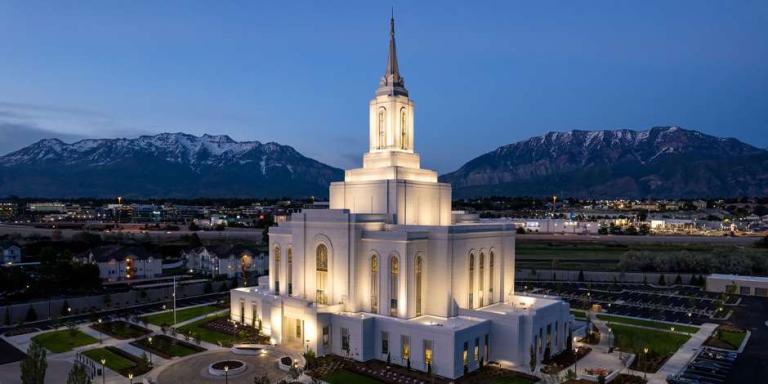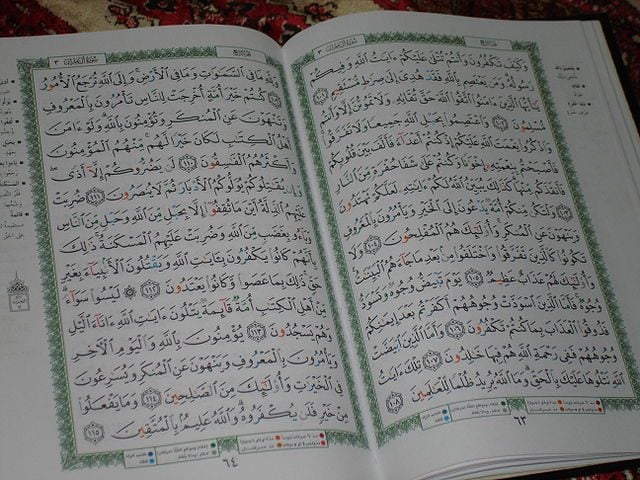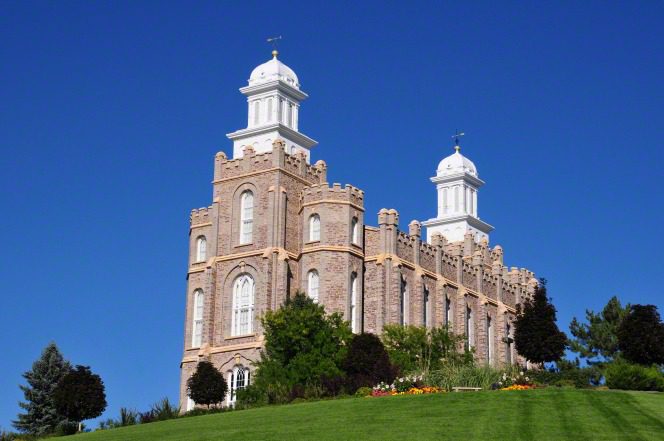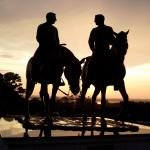
In our priesthood meeting today, we considered the address given by Elder Ulisses Soares of the Quorum of the Twelve Apostles at the most recent annual General Conference of the Church of Jesus Christ of Latter-day Saints. It is entitled “Covenant Confidence through Jesus Christ.” The passage in his remarks that most stood out to me is actually repeated twice, almost verbatim. I think that Elder Soares really wanted us to register the point that he was making:
Therefore, if we change our preparation to enter the temple, we will change our experience in the temple, which will transform our lives outside of the temple. . . .
The ongoing and accelerating building of temples will continue to excite, inspire, and bless us. Yet more important, as we change our preparation to enter the temple, we will change our experience in the temple, which will transform our lives outside of the temple.

A week ago today, I posted a blog entry entitled “It’s So Big!” in which I compared the length of the Book of Mormon to the length of the longest books in the Hebrew Bible and the New Testament, and to that of the Qur’an. It had hit me with peculiar strength that day how very long the Book of Mormon is. On the strength of those comparisons, I observed that “Joseph Smith is by far the single most prolific contributor of purportedly scriptural text within any significant strand of the Judeo-Christian or Islamic religious tradition.”
Over on the Peterson Obsession Board, at least, some of The Usual Suspects soon began, as is their custom, to misunderstand what I had written and to deride and mock their faulty misreadings of what I had posted:
- I had, they said, argued that its sheer length proves the Book of Mormon true — despite the fact that I had written “Of course, its sheer length doesn’t prove the Book of Mormon true.”
- I had, they alleged, argued that its greater length makes the Book of Mormon better than the Qur’an and the various biblical books, despite the fact that I hadn’t said anything of the sort and hadn’t addressed the question of quality or richness. (“I’ve said,” I had observed, “nothing at all here about the richness and complexity of the Book of Mormon, on which I could say a very great deal.”) In observing that the Book of Mormon is longer than those other books, I intended to say, simply, that the Book of Mormon is longer than those other books.
- But no. I wasn’t to be let off so easily: In observing that the Book of Mormon is longer than the Qur’an, one said, I was attacking the Qur’an. Why? Because I’m an anti-Muslim bigot. He argued, essentially, that if I accept the Book of Mormon as central to my personal religious faith instead of the Qur’an, that makes me an anti-Muslim — a principle that, if it were consistently followed, would (I suppose) class believing Jews as, by definition, anti-Christian, and Catholics as ipso facto anti-Protestant and Protestants as anti-Catholic and Presbyterians as anti-Methodists and Greek Orthodox as anti-Reformed and etc., and etc.
- One of them was indignant at my having located the Book of Mormon — along with the Torah, the New Testament, and the Qur’an — within what I called “the Abrahamic tradition.” He counted the number of times that Abraham is named in the Book of Mormon and found the total insufficient. Of course, I was simply using a fairly standard categorization from the field of comparative religion and the history of religion, which distinguishes the Abrahamic family of religions, including Judaism and Christianity and Islam — and the Church of Jesus Christ of Latter-day Saints as a species of the genus Christianity — but does not include, say, Hinduism, Buddhism, Zoroastrianism, Shinto, Confucianism, or animism.

The following appeared on the Interpreter Foundation’s Facebook page and went out to our entire volunteer list. I think it appropriate to share here, as well:
We at the Interpreter Foundation were saddened to learn on the morning of Tuesday, 20 August 2024, of the death of our dear friend and associate George Mitton. As his obituary illustrates, he and his remarkable wife, Ewan Harbrecht Mitton, had led very full lives and made many contributions before they moved back to Utah in retirement. It was after their arrival in Utah that he became a valued volunteer for the old Foundation for Ancient Research and Mormon Studies (FARMS) and its successor, BYU’s Neal A. Maxwell Institute for Religious Scholarship. Thereafter, he was among the co-founders of the Interpreter Foundation, for which he both wrote and edited. We will miss him very much, but we rejoice at the thought of the glorious reunions that he is currently enjoying.
His funeral will be on Monday, August 26 at 10 am and will be live-streamed. Go to https://nelsonmortuary.com/obituaries/george-mitton for more information.
And here is the text of George’s obituary:
George LeRoy Mitton age 97, peacefully passed away on August 20, 2024, at his home in Provo, Utah from natural causes. He is preceded in death by his sweet wife (Ewan Harbrecht Mitton) of over 60 years, his older sister (Anna Lee Dransfield), and his parents (Samuel and Johann Mitton). He is survived by his younger brother Reid (Sanna), his four children: Elizabeth Larsen (Shirl), David L. Mitton (Andrea), John P. Mitton (Nancy), and Esther Phelts (Charles), all of whom live in Utah. He is also survived by 20 grandchildren and 41 great grandchildren.
George was born in Logan, Utah on August 10, 1927, a son of Samuel LeRoy Mitton and Johann Smith Mitton. He was educated in the Logan City Schools, graduating from Logan High School in 1945. He served in the Army Air Corps from 1945-46. He attended Utah State University, graduating with bachelor’s and master’s degrees in political science and economics. George met Ewan E. Harbrecht in New York City where he was a student attending Columbia University and Ewan was a musician and concert singer. They were married June 19, 1957, in the Salt Lake Temple by Pres. David O. McKay where President McKay pronounced George “a wise man and very fortunate.”
He worked two years in Olympia, Washington for the Washington State Research Council, doing research in problems of state and local government. He pursued additional graduate studies in Public Administration at Columbia University. While in New York, he taught one year at the City College of New York, and was employed by the Connecticut Tax Study Commission, and as an Economic Analyst for American Airlines. In 1961 he moved with his family to Salem, Oregon, to begin employment with Oregon State government, serving until 1987 in several capacities, first as an administrative analyst in the Governor’s budget office, and for some years as Assistant Director of the Education Coordinating Commission. During this period Ewan taught vocal music and opera workshop on the faculty of Western Oregon State University at Monmouth, Oregon.
After they retired in 1988, they moved to Provo, Utah to be near their children. Ewan continued her music activities, and George has pursued an interest in history, particularly church history and doctrine. He served as a volunteer for the Foundation for Ancient Research and Mormon Studies (FARMS), and for several years as an Associate Editor of The FARMS Review. From 2012 he was a charter member and associate editor for the Interpreter Foundation. Here, he focused on book reviews and provided many contributions to the publication even as recently as one week before his passing. Quoting Dan Peterson (Founder of Interpreter) “George was soft-spoken, kind, funny, incisive, hard-working and deeply loyal to the Kingdom of God.”
George has been an active member of the Church of Jesus Christ of Latter-day Saints all his life serving a mission to London England (1949-51), Sunday School Teacher, Bishop’s Councilor, High Councilor and Bishop.
Funeral services will be held Monday August 26, 2024, at the Nelson Family Mortuary located at 4780 North University Ave, Provo UT 84604.
Viewing: 9:00AM
Funeral: 10:00AM
Interment: Logan City Cemetery (Same Day)
Show your love and support to George’s family by adding your name to George’s Guest Book.












